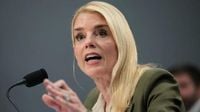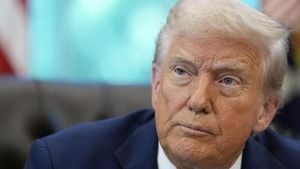Attorney General Pam Bondi is once again at the center of controversy in Washington, following a string of clashes with Justice Department ethics staff over the acceptance of gifts and her conduct at high-profile events. According to recent reports from The New Yorker and The Independent, Bondi has repeatedly pushed back against established ethical guidelines, raising eyebrows both within the Department of Justice (DOJ) and among members of Congress.
The latest episode unfolded after Bondi, appointed by President Donald Trump to lead the DOJ, argued for her right to keep a set of cigars gifted by MMA fighter and political hopeful Conor McGregor. She also sought to retain a FIFA soccer ball tossed to her by President Trump himself. While it’s not unusual for new officials to need time to adjust to the sometimes arcane rules of federal ethics, staffers say Bondi’s resistance was well beyond the norm. As one DOJ source told The New Yorker, “Every new administration needs time to adjust to ethics rules that might seem trivial. What wasn’t normal was the amount of pushback that we got.”
Bondi, through a spokesperson, has denied resisting department-wide ethical guidelines. Speaking to The New Yorker, her office also rejected claims that she overstayed her welcome in Trump’s VIP suite at the FIFA Club World Cup final in July 2025. Yet, the details reported by both outlets suggest a pattern of behavior that has left DOJ ethics staff frustrated and, at times, incredulous.
The FIFA match incident has become emblematic of Bondi’s approach. Despite being told that her attendance in the VIP booth could be seen as a violation of DOJ rules—unless she was officially requested by the president—Bondi and her husband joined Trump in his luxury box for significant portions of the match. Her justification? She asserted that she needed to remain close in case the president required an urgent briefing. As The Independent pointed out, this rationale is highly unusual; attorneys general have never before cited such a need to attend a sporting event alongside the president. It’s also unclear what type of emergency would necessitate a DOJ briefing at a soccer match on a Sunday afternoon.
Ethics staff reportedly reminded Bondi that the DOJ is not the primary agency a president would consult in the event of a national emergency, whether that’s a terrorist attack, a natural disaster, or another crisis. She was told she could enter the box to answer questions, but that should be the extent of her interaction. Nevertheless, Bondi pressed for her own seats in the VIP area and, after being denied, joined Trump anyway, according to the reporting.
This friction over gifts and access is just the latest challenge for Bondi, whose tenure as attorney general has been dogged by criticism from both inside and outside the administration. Many officials reportedly blame her for what they describe as missteps in the handling of the Jeffrey Epstein case, a saga that has continued to haunt the DOJ years after Epstein’s death in federal custody in 2019.
Epstein’s demise, ruled a suicide, has fueled endless speculation and conspiracy theories, especially given his connections to some of the world’s most powerful figures. Ghislaine Maxwell, Epstein’s longtime associate, remains the only other person convicted in connection with the case. The public’s appetite for answers has not waned, and Bondi’s management of the investigation’s records has only intensified scrutiny.
Earlier in 2025, Bondi’s Justice Department oversaw what was billed as a “phase one” release of documents tied to the Epstein investigation. But in July, the DOJ abruptly reversed course, issuing a memo that no further releases would occur. This decision, reported by both The New Yorker and The Independent, reignited fierce debate over Epstein’s connections—including his documented friendship with Trump—and whether a so-called “client list” of men who participated in criminal activity with Epstein actually exists.
Bondi herself has been explicit on this point, declaring that the much-rumored list simply does not exist. Her statement, meant to put speculation to rest, instead seemed to pour fuel on the fire. At the same time that her team was butting heads with DOJ ethics staff over gifts and event attendance, Bondi was also engaged in damage control regarding the Epstein probe. The Justice Department even filed a motion to unseal grand jury transcripts from the investigation—a move widely viewed as a long shot—which was ultimately denied by the courts. This allowed the administration to shift blame, at least in part, for the lack of transparency about the case.
The fallout has not been limited to the DOJ. Members of Congress from both parties, frustrated by the lack of progress and transparency, are preparing to take matters into their own hands. Lawmakers are currently circulating draft legislation that would force the Justice Department to release additional records from the Epstein case. The bill is expected to be introduced when Congress returns to session in September 2025, setting the stage for a potential legislative showdown over one of the most closely watched criminal cases in recent memory.
Bondi’s defenders argue that much of the criticism is politically motivated, pointing out that every new administration faces a learning curve with federal ethics rules. They note that previous attorneys general have also been scrutinized for their conduct, though few have generated as much sustained controversy as Bondi in such a short period. Her supporters also highlight her efforts to bring some degree of closure to the Epstein saga, insisting that her statements about the nonexistence of a client list are based on the investigation’s actual findings, not political expediency.
Critics, however, see a pattern of behavior that raises serious questions about Bondi’s judgment and commitment to transparency. They argue that her pushback against ethics staff, her insistence on keeping gifts, and her presence in Trump’s VIP suite all suggest a disregard for norms designed to protect the integrity of the Justice Department. The controversy over the Epstein investigation, they say, is just the most high-profile example of a broader problem.
As Congress prepares to debate new legislation and the DOJ grapples with internal dissent, Bondi’s future as attorney general remains uncertain. The coming months are likely to bring even more scrutiny, both from lawmakers seeking answers on Epstein and from watchdogs monitoring her adherence to ethical standards. With the eyes of Washington—and much of the country—fixed on her every move, Bondi’s actions will continue to shape not just her own legacy, but the public’s trust in the institutions she leads.
For now, the questions swirling around Pam Bondi, her approach to ethics, and her stewardship of the Epstein case remain unresolved, promising more heated debate as the story unfolds.





